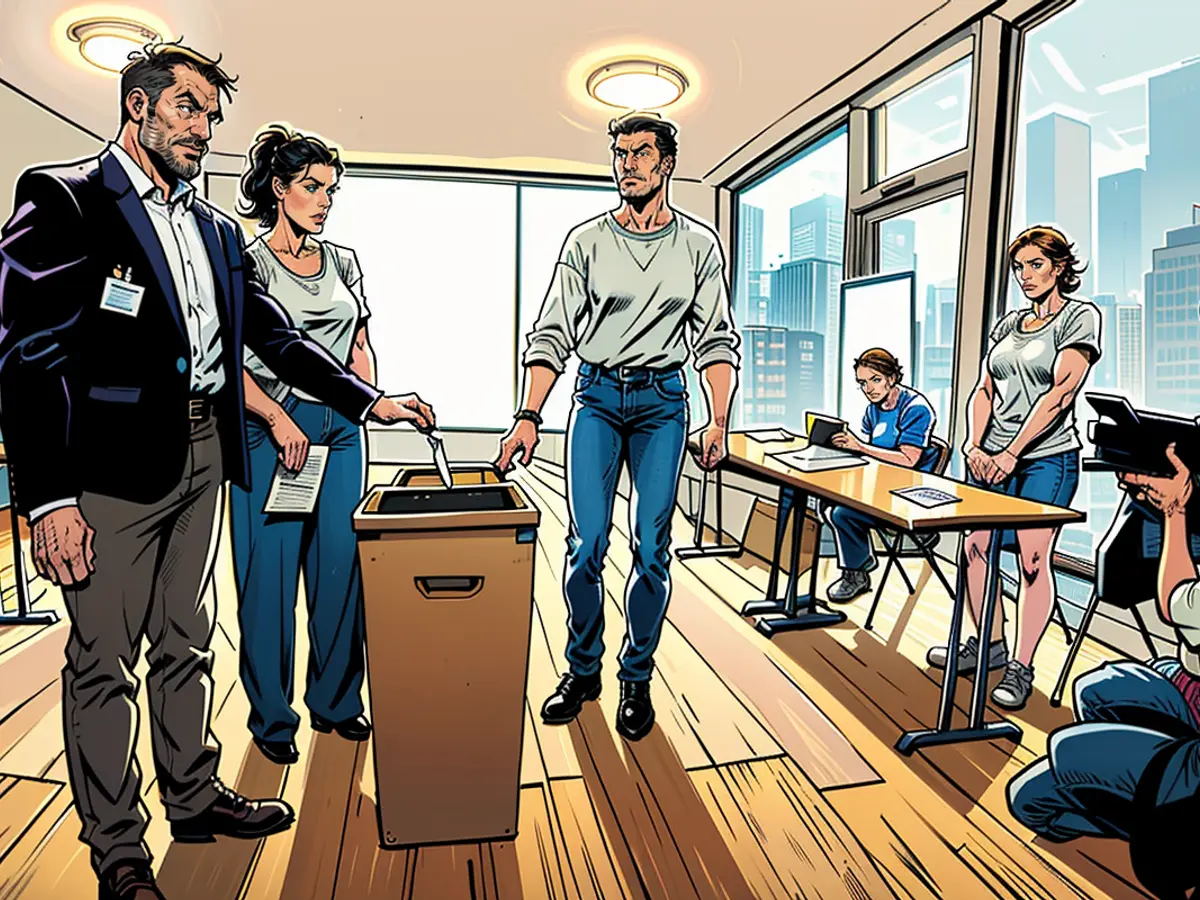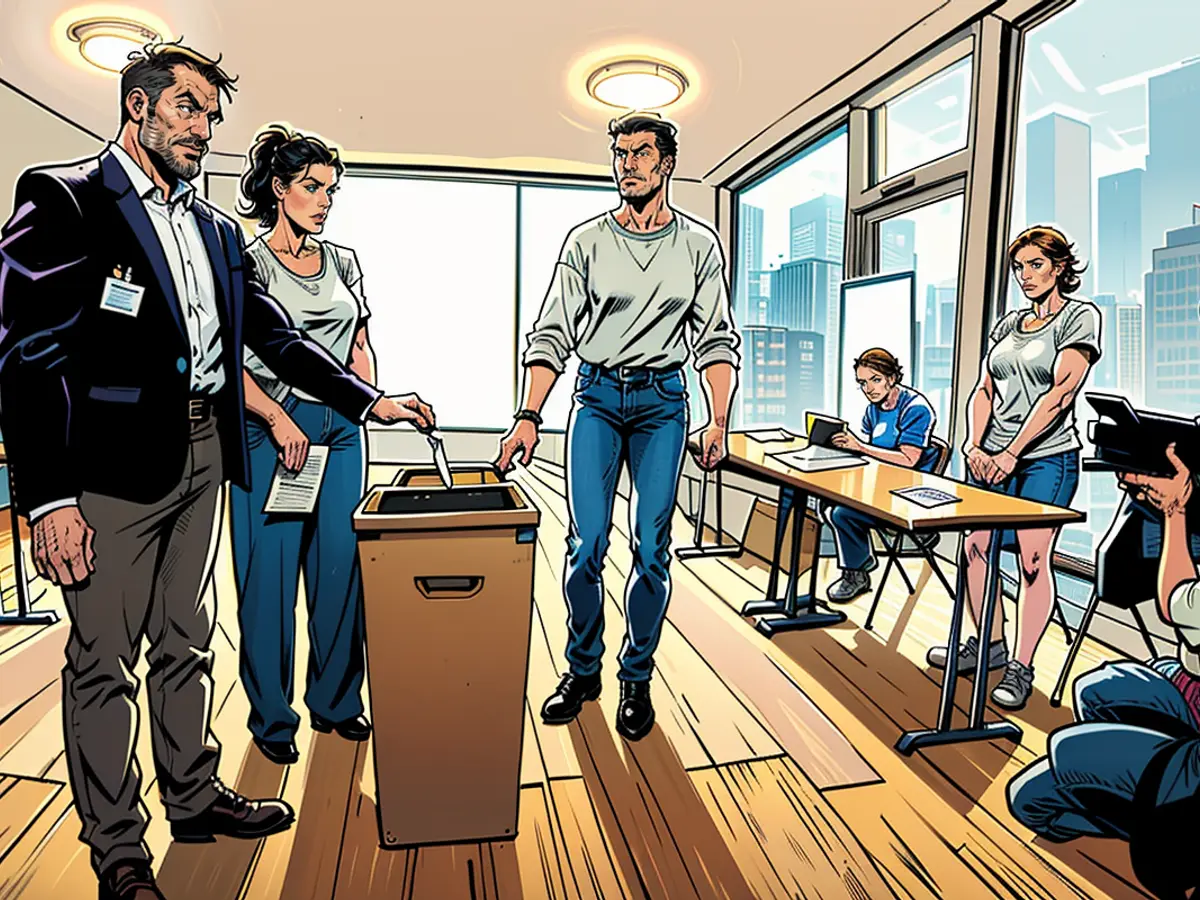In the perspective of Saxony and Thuringia, these matters hold significant significance.
Around a third of people in Saxony and Thuringia plan to vote for the AfD in the upcoming September 1st elections, as indicated by a major survey. This piece explores the reasons behind this trend, focusing on the primary concerns and issues at hand. Immigration is merely one of these issues.
14:13 Hoecke swiftly departs from polling stationThe AfD's leading candidate in Thuringia, Björn Hoecke, casts his vote around midday at the Bornhagen polling station. He doesn't linger for long and declines to speak with journalists present at the scene. Hoecke, who typically loses to the CDU candidate in his home constituency of Eichsfeld, has relocated to the Greiz constituency for this election. However, he is still expected to face defeat against the CDU there.
13:50 Thuringia voter turnout matches 2019 pace at middayThe voter turnout in Thuringia appears to be in line with the 2019 parliamentary election level at noon, according to the state election monitor. Around 32% of eligible voters had cast their ballots in polling stations by 12 pm, without considering postal votes. This figure is identical to the 2019 turnout rate at this time. There seems to be more interest in the Thuringia state election compared to the European and local elections held earlier this year. In June, the turnout rate was 24.3% at the same time.
13:29 High voter turnout anticipated in SaxonyThe Saxony state election is expected to witness a high voter turnout, based on preliminary figures. By midday, 25.8% of eligible voters had cast their ballots, according to the Kamenz Statistical State Office. In the 2019 state election, the turnout rate was 26.2% at the same time. However, these figures do not include postal voters, with an estimated 24.6% expected to vote by post. In 2019, postal votes accounted for 16.9%. The elections have thus far progressed without any reported disruptions or issues.
13:11 Lucke predicts potential impact on Berlin coalitionThe outcome of the Saxony and Thuringia state elections is still unknown. If the SPD fails to secure a seat in the state parliament, political scientist Albrecht von Lucke believes this would almost amount to an "earthquake," as discussed in an ntv interview.
12:44 Police probing threat at polling stationPolice are investigating a threat at a polling station in Gera. A man wearing an AfD T-shirt entered the polling station to vote in the morning. Upon being asked to remove the shirt, as party advertising was prohibited within the polling station, the man complied but threatened to return, displeased with how he was treated upon leaving the polling station grounds. Police took a statement and issued a warning to the man. Additionally, Erfurt police are investigating vandalism, as a man scrawled "Hoecke is a Nazi" near polling stations.
12:15 Correctiv warns against widespread false informationResearch network Correctiv cautions against the continued spread of a false claim that signing ballot papers prevents voter fraud. The German Returning Officer's office clarified that voters must not sign their ballot papers, as doing so compromises the secrecy of the vote, rendering the entire ballot paper invalid.
11:51 Voigt hopes for "stable majority relations"Thuringia's CDU top candidate Mario Voigt has now cast his vote. He expresses hope that many Thuringians would exercise their right to shape their country's future, anticipating the establishment of "stable majority relations" to allow the state to resume progress.
11:25 Sonneberg experiences significant surge in far-right attacksSonneberg, the first district in Germany led by an AfD politician, has seen a significant increase in reported far-right attacks. This has resulted in numerous citizens resigning from their work due to perceived threats. The number of far-right incidents has also quadrupled within a year, with experts attributing this to the involvement of the AfD district administrator.
10:57 Kretschmer voices sentiments at polling stationSaxony's Prime Minister Michael Kretschmer views the state election as "probably the most significant since 1989." Upon casting his vote in Dresden, Kretschmer expresses gratitude to those who changed their voting habits, opting for the "strong force in the bourgeois center," namely the Saxony Union. Kretschmer's CDU currently trails closely behind the AfD in recent polls.

10:30 Ramelow recognizes Wagenknecht's absence from the ballotThuringia's Prime Minister Bodo Ramelow regards election day as a "festival of democracy" - even if his re-election becomes uncertain. In an ntv interview, Ramelow explains that he does not endorse a minority government and doubts the competence of the BSW. Wagenknecht, although associated with the Left Party, is not a candidate in this election.
09:59 "No historical sensitivity" - historian laments about election dateHistorian Peter Oliver Loew expresses discontent over the election date for the state elections in Saxony and Thuringia on the 85th anniversary of the German invasion of Poland in 1939. Loew, the head of the German Institute for Polish Affairs, voiced his opinion to Redaktionsnetz Deutschland (RND), saying, "Anyone who thought it was a good idea to hold elections on September 1st lacks historical sensitivity."
09:30 "Decisive election": All data on the Saxony state electionApproximately 3.3 million eligible voters in Saxony have the opportunity today to decide who will shape the political landscape of the Dresden state parliament moving forward. The CDU may lose its position as the leading force in the state for the first time since 1990. Saxony's Prime Minister Michael Kretschmer refers to this election as "crucial." "It's all on the line."
09:05 Kretschmer accuses traffic light of "rush job before the election"It's election day in Saxony, and the question is: Will Minister President Michael Kretschmer extend the CDU's winning streak in the state? In an interview with ntv, he discusses his stance on the refugee debate, the traffic light government, and the Ukraine war.
08:24 Can the AfD threaten democracy?
Surveys suggest: The AfD is likely to gain significant influence in the upcoming elections in Saxony and Thuringia. This poses a threat to democratic institutions, as a research group has pointed out. The rule of law may not be as robust as people think.
08:00 Polling stations open in Thuringia and Saxony
Today, new parliaments are being elected in Thuringia and Saxony. In the polls, the AfD is leading in Thuringia. In Saxony, the CDU of incumbent Minister President Michael Kretschmer and the AfD are in a tight race. The first projections are expected with the closing of polling stations at 6 pm. The elections in the two eastern German states serve as a barometer for the traffic light coalition in Berlin.
For the current Thuringian coalition government led by Minister President Bodo Ramelow (Left), there is no majority in the polls. A potential post-election option includes a government consisting of the CDU, the Sahra Wagenknecht Alliance (BSW), and the SPD. In Saxony, it's uncertain if the current coalition of CDU, SPD, and Greens still holds a majority. Kretschmer does not rule out an alliance with the BSW. The Left party faces the risk of being ousted from the parliament in Saxony. The same fate may befall the Greens and FDP in Thuringia.

12:44 When asked about the strong support for the AfD in Thuringia, a CDU spokesperson expresses concern, stating that they believe a significant vote share for the CDU is crucial to maintaining a stable political landscape in the state.
13:11 In light of the rising support for the AfD and potential losses for the SPD and Greens, some analysts suggest that a coalition between the CDU and the BSW could emerge as a viable option in Thuringia, potentially shifting the political landscape in Saxony as well.
These sentences contain the word ['The CDU'] and are preceded by the given text. The first sentence discusses the CDU's concerns regarding the AfD's rise in Thuringia, while the second sentence explores the potential implications of the election results for both Thuringia and Saxony, mentioning the CDU's potential role in a new coalition.








